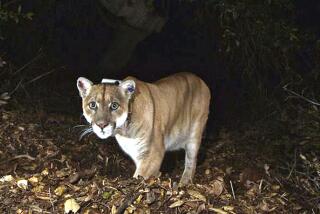Legislation could add roadkill to Montana menus
- Share via
The idea came from something a state lawmaker noticed while cruising the wide-open roads of Montana. The highway often has carcasses — plenty of them.
“There are a lot of animals and a lot of roadway in Montana,” state Rep. Steve Lavin said. “I’ve had a ton of people ask me after striking a deer or an elk, ‘Can I take it?’ And I have to say no.’”
But that could soon change.
If a bill becomes law, Montana motorists could take home certain roadkill — and cook it up.
And no, the “roadkill bill” — HB 247 —wouldn’t mean open season on animals on the state’s roadways. The legislation, which cleared the state Senate in March and awaits the governor’s signature, emphasizes that the animal has to have been accidentally killed.
In 2011, the most recent year available in the Montana Department of Transportation’s “carcass database,” there were more than 1,900 collisions between vehicles and wild animals in the state. Of the more than 10 types of animals that make the carcass list — including black bears, bighorn sheep and mountain lions — white-tailed deer are the most common.
Lavin, a Republican, said the meat now goes to waste. Well, most of it.
If a dead animal still looks “good and fresh,” he said, sometimes officials reach out to local food banks to see whether they could use the meat.
“Technically that’s against the law, but it is happening,” Lavin said, adding that the practice influenced him to write the bill.
“It’s just a small measure to help out people and not waste food,” he said.
June Munski-Feenan, 85, director of a food bank in the northwestern part of the state, says that taking in wild animals — from salvaged road kill and from hunters — helps her feed more people.
“We save all the food we can up here,” Munski-Feenan said of her Whitefish food bank, which has processed moose, antelope and bear.
“People try the bear and they like it. If you get a young bear, it’s delicious. It’s kind of like pork.”
Salvaging meat is a team effort, she said. One time she called a local towing company at 2 a.m. and a couple of employees went out to pick up a dead elk and haul it to the food bank.
“Everybody is ready to do something for free here,” she said, adding that she hopes the bill becomes law.
“That would help us quite a bit,” she said. “But I don’t know how it will go.”
The Montana Department of Fish, Wildlife and Parks, which would be charged with deciding the specifics of the permit process, has some concerns about the perils of picking up roadkill.
“There are all kinds of issues with human health and safety,” department spokesman Ron Aasheim said, adding that the meat could be spoiled or the animal could carry some type of disease.
Lavin brushes aside those concerns.
“If you use common sense, it’s pretty easy to see what’s good and what’s bad,” he said.
Munski-Feenan said it hasn’t been a problem at her food bank. “We wouldn’t take anything that we wouldn’t eat ourselves,” she said.
If the bill becomes law, Aasheim said, it will be up to the individual, not the wildlife department, to decide whether the meat is OK to eat.
“We’re not a health agency,” he said. “We’re not going to be the agency liable for that.”
If dead game does become fair game, Montana will be in the company of a handful of other states.
In Illinois, for example, residents can pick up dead deer as long as they report it, aren’t behind on their child support payments and don’t have suspended wildlife privileges.
In West Virginia, if motorists kill anything other than protected birds, spotted fawn or bear cubs, and report it within 12 hours, they can keep it.
More to Read
Sign up for Essential California
The most important California stories and recommendations in your inbox every morning.
You may occasionally receive promotional content from the Los Angeles Times.













